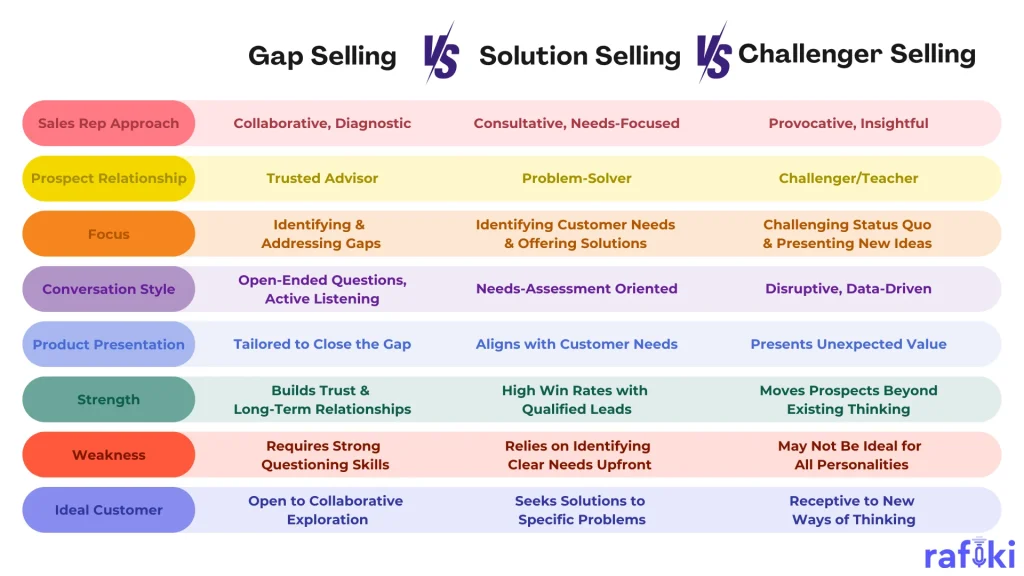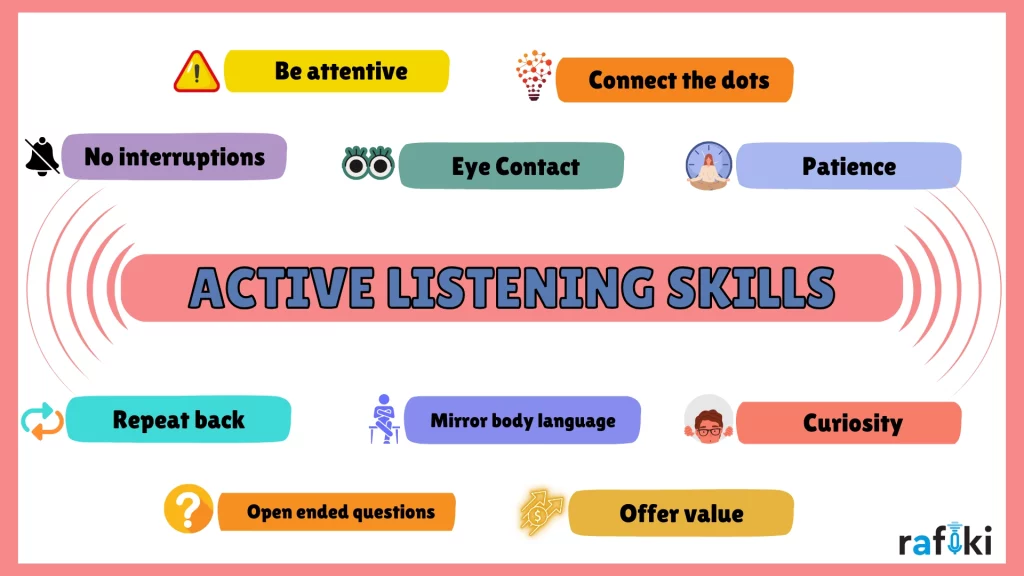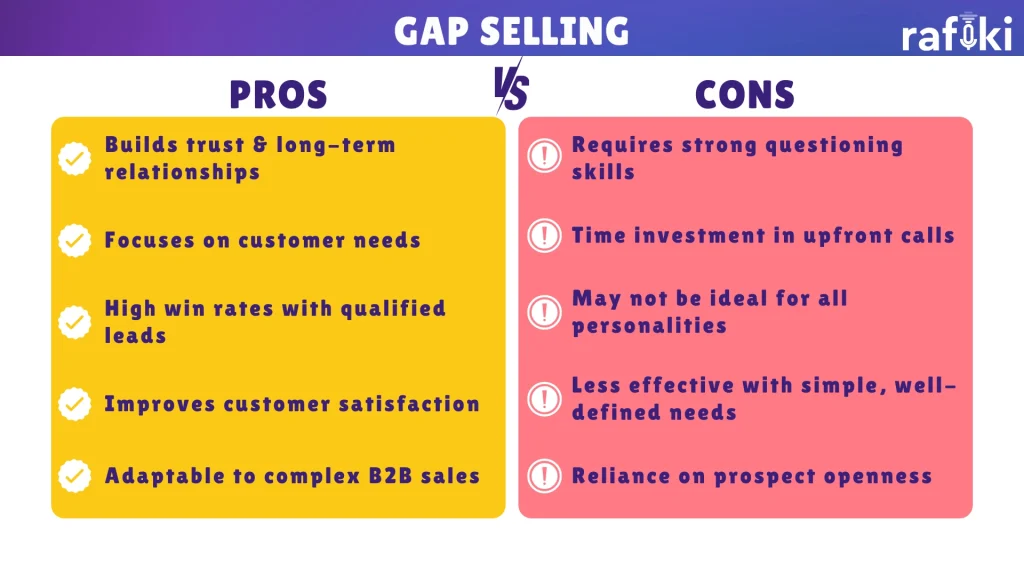Why Rafiki
Pricing


Pricing
Solutions

RevOps Leaders
Synchronize revenue generating functions

SDR Leaders
Get your team aligned and Coach your Reps 3x faster at scale

Sales Leaders
Unlock pipeline truth, drive confident forecasts

Ever stare at your sales dashboard with a pit in your stomach? Numbers flatlining, quotas looming, and that sinking feeling that your team just isn't firing on all cylinders? You're not alone. The gap between where your salesforce is and where you need them to be can feel vast. But what if there was a sales methodology designed to bridge gaps for your team as well as your prospects? Enter Gap Selling.
Let's dive in!
Gap Selling, developed by Keenan (CEO and president of A Sales Growth Company) ditches the traditional product-pushing approach. Instead, it focuses on identifying the unique gap between a prospect's current situation and their desired goals.
Imagine your prospect is stuck on one side of a river, and your solution is the bridge to get them across. By understanding their current state (their challenges, inefficiencies) and their desired future state (their goals, aspirations), your reps can tailor their approach to bridge that gap. This collaborative method builds trust, creates value for the customer, and ultimately leads to more deals.

Here's how Gap Selling translates into action:
While Gap Selling focuses on bridging the gap between a prospect's current state and desired state, the sales landscape offers other methodologies with distinct approaches. Here's a breakdown comparing Gap Selling, Solution Selling, and Challenger Selling:

The best methodology depends on your sales team, target audience, and product offering. Gap Selling excels at building trust and long-term relationships, making it ideal for complex B2B sales. Solution Selling shines with well-defined customer needs and a clear solution fit. Challenger Selling thrives with prospects open to disruption and innovative approaches. Consider a hybrid approach if your product offers both problem-solving value and disruptive potential.
Gap Selling isn't just a fancy term; it's a practical framework you can implement to empower your salesforce. Here's how to get started and equip your reps to bridge the gap to success:
Train your reps to identify the prospect's current state (their challenges and frustrations), their desired future state (their goals and aspirations), and the gap in between. Role-playing exercises can hone their questioning skills to uncover these vital details.
Consider the different aspects of the context such as “What is the prospect’s environment like?”, “Define the problem”, “How important/urgent is this problem? What would happen if it’s not solved?”, “Is the prospect in the right state of mind to discuss the problem?” and “Is the timing right?”.
Ask yourself “Is this a bridge they will be crossing only once or will it be ongoing?”, “How can this future state be sustainable with respect to the prospect’s other processes and teams?” and “Would the prospect require continued hand holding?” and the like.
Consider questions like “Can the gap be bridged with just my solution, or would the prospect need to take on additional solutions?”, “What are the variables that could affect my solution’s ability to bridge the gap?”, “What are the root causes for this gap?” and so on.
Encourage reps to truly listen to prospects, not just wait for their turn to talk. Open-ended questions and active listening techniques will unearth the root causes of the prospect's problems and pave the way for a solution-oriented conversation.

Gone are the days of generic sales pitches. Gap Selling equips reps to tailor their product or service presentation directly to closing the identified gap. Focus on how your offering bridges the distance between the prospect's current reality and their desired future.
Gap Selling isn't about forceful persuasion; it's about building trust. By acting as a trusted advisor who understands their needs, reps can demonstrate how your solution empowers them to achieve their desired outcomes.
Track key metrics like win rates, deal size, and customer satisfaction. Analyze call recordings with tools like Rafiki's Smart Call Summary to identify areas for improvement and coach your reps to refine their Gap Selling skills. Rafiki can also be used to identify common customer challenges and buying signals, helping reps tailor their conversations even more effectively.
Before we get into the ways of tracking & optimizing your gap selling implementation, let us remind ourselves of the pros & cons. This will help give you better context when deciding your optimizations.

So, you've equipped your team with the Gap Selling framework. Now it's time to measure its impact and make adjustments for continuous improvement. Here are some actionable tips to track and optimize your Gap Selling approach:
Focus on metrics that reflect the success of Gap Selling. Win rates, deal size, and customer satisfaction are all crucial indicators. Additionally, track metrics like the average time spent discussing the prospect's current state and desired state. This can reveal the effectiveness of your questioning techniques and how well reps are identifying the gap.
Don't just collect data – analyze it! Look for trends and patterns that might indicate areas for improvement. For instance, are reps struggling to close deals with a specific buyer persona? Maybe additional training on addressing that persona's unique challenges is needed.
Tools like Rafiki's Smart Call Scoring can be invaluable for optimizing Gap Selling. Analyze call recordings to identify areas where reps might be missing opportunities to delve deeper into the prospect's current state or desired state. Rafiki can also pinpoint positive behaviors to replicate and share best practices across your team.
Regular coaching sessions are essential for helping reps refine their skills. Analyze call recordings together, focusing on strengths and weaknesses. Role-playing different scenarios can help reps practice overcoming challenges and mastering the art of uncovering the gap.
By consistently tracking metrics, analyzing data, and implementing coaching, you can ensure your team is continuously honing their skills and bridging the gap to sales success.
Gap Selling isn't a magic bullet, but it's a powerful tool to propel your sales team forward. By focusing on building trust, understanding customer needs, and bridging the gap between their current reality and desired future, you can empower your reps to close more deals and cultivate long-term customer relationships.
Implement & Optimize Gap Selling
mplementing Gap Selling requires ongoing effort and refinement. Rafiki's conversation intelligence platform can be your secret weapon, helping you track key metrics, analyze call recordings, and coach your reps to master the art of Gap Selling. Ready to bridge the gap to sales success? Sign up for your free 14-day trial of Rafiki today and see the difference data-driven insights can make for your tea